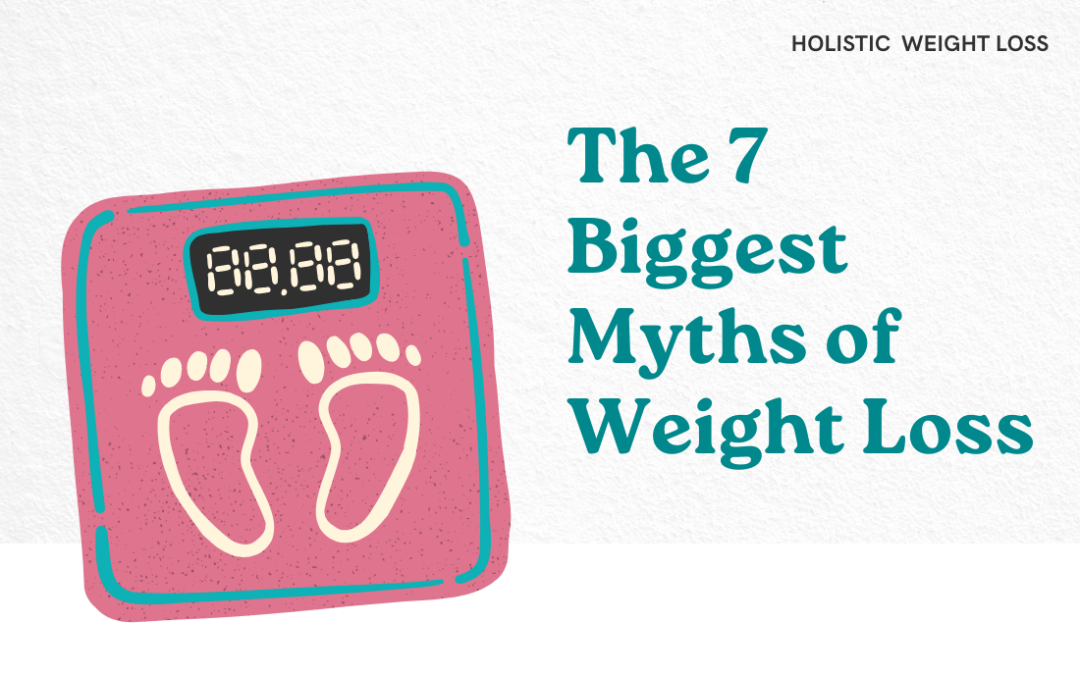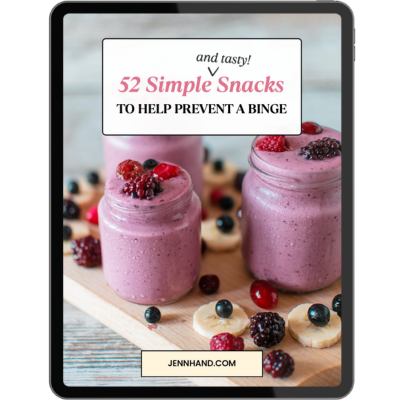Written by Jenn Hand, Holistic Nutritionist, Board Certified Health Coach, NBC-HWC
If you’ve been in the diet world for any length of time, you know how frustrating the weight battle can be.
But what if we’re believing the wrong things about weight loss? After helping hundreds of women overcome late-night bingeing and finding their normal, I know a thing or two about what works, what doesn’t and what keeps us stuck!
This blog is going to debunk the 7 biggest myths of weight loss and show you where to focus instead.
I recently received an email from a blog reader who said:
Is it normal that this journey is mind numbingly frustrating at times? I feel like I’ve made great strides in the areas of “normal” eating. I’ve let go of dieting overall (although I do still overeat at times). But my weight hasn’t budged. What is the big secret to losing weight?! How can I view this part of the journey in a different way?
It can be incredibly frustrating when you’ve been desperately trying to find your “normal” around food but feel like you’re not making any progress in the weight realm. There are so many “old tapes” we cling to and myths about diet and exercise that can keep us stuck. We’re exploring all of this and more in today’s blog!
Topics in This Article:
- So What Are the 7 Biggest Myths of Weight Loss?
- The True Key To Weight Loss
- Three Areas to Focus On Instead of Weight
- How I Found My Happy Weight (Personal Story)
So What Are The 7 Biggest Myths of Weight Loss?
If you google “how to lose weight”, approximately 4 million different articles come up.
Most of the advice is fad diets, unsustainable food programs and advice that doesn’t consider our preferences, lifestyles and complicated relationship to food.
Since we are not robots (It’s not as simple as drink kale smoothies + run 5 miles = weight loss), our relationship to weight is complicated.
Here are the top weight loss myths debunked, and if you prefer to listen to it on the podcast listen below.
Myth #1: Losing weight is a linear process
I wish this one was true! I can’t tell you how many times I yearned for this process to be linear and straightforward.
The reality is, underneath our food and weight struggles is a lot of other stuff!
(I.E. we don’t trust ourselves around food, we feel out of control, we loath our bodies which impacts food choices, we try to be “good” all the time, we feel guilt over good vs bad foods, we don’t know how to stop bingeing, etc)
If you’re feeling like this process is a few steps forward, a step back, a detour to the side, a missed step, and then questioning any progress at all? That’s normal.
You ARE making progress. It’s just not linear. Sometimes seeds are planted and sprout down the road. Other times we need to hear something multiple times before it clicks.
The beliefs that become ingrained in our minds from the diet world take some time to “unlearn” as we are strengthening the habits and beliefs that better serve us. (Read my “How Long It Took Me to Be a Normal Eater” here! I tell you the exact details of my diet journey.)
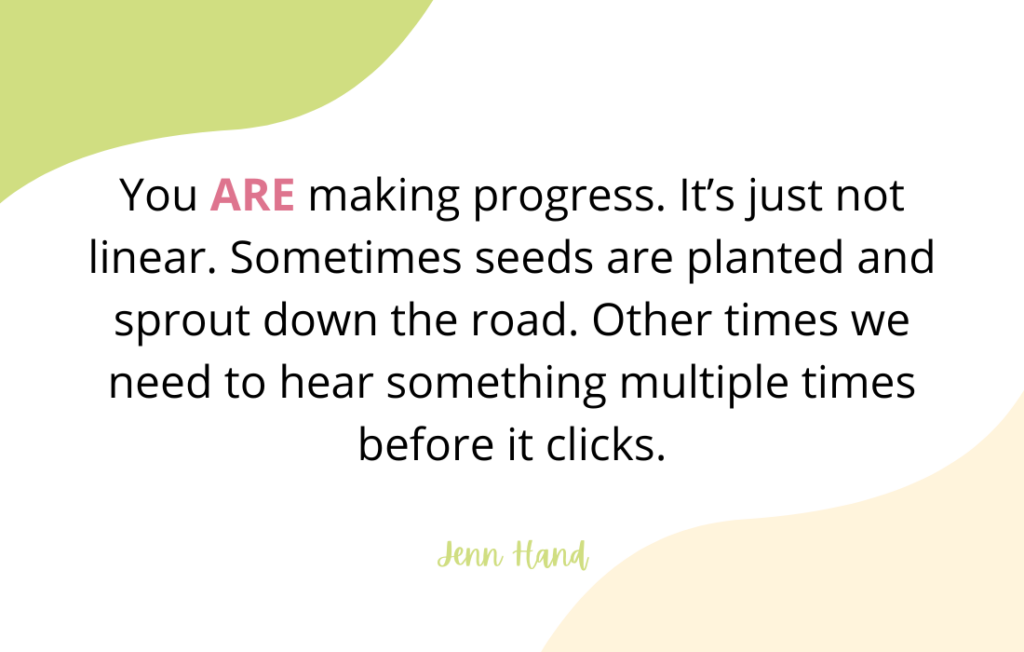
Myth #2: Carbs make you put on weight
Carbs get a bad rep when we’re dieting.
I work with so many women on breaking the “carbs are bad” food rule (that was one of my most stringent rules I tried to adhere too when I was trying to control my food!)
Almost all of us have the “carbs make you gain weight” belief in our minds.
But remember that vegetables, fruits, beans, peas…are all considered carbohydrates! I’m a firm believer in all foods have their place.
That doesn’t mean you just eat noodles and bread every meal, but it means that working to find a balanced approach where you can enjoy a piece of pizza IS a part of the larger strategy in finding a comfortable weight.
No food is good or bad; it’s about finding what works and nourishes YOUR body instead of adhering to some prescribed plan. (And that usually includes finding a more balanced relationship to carbs! More on carbs here!)
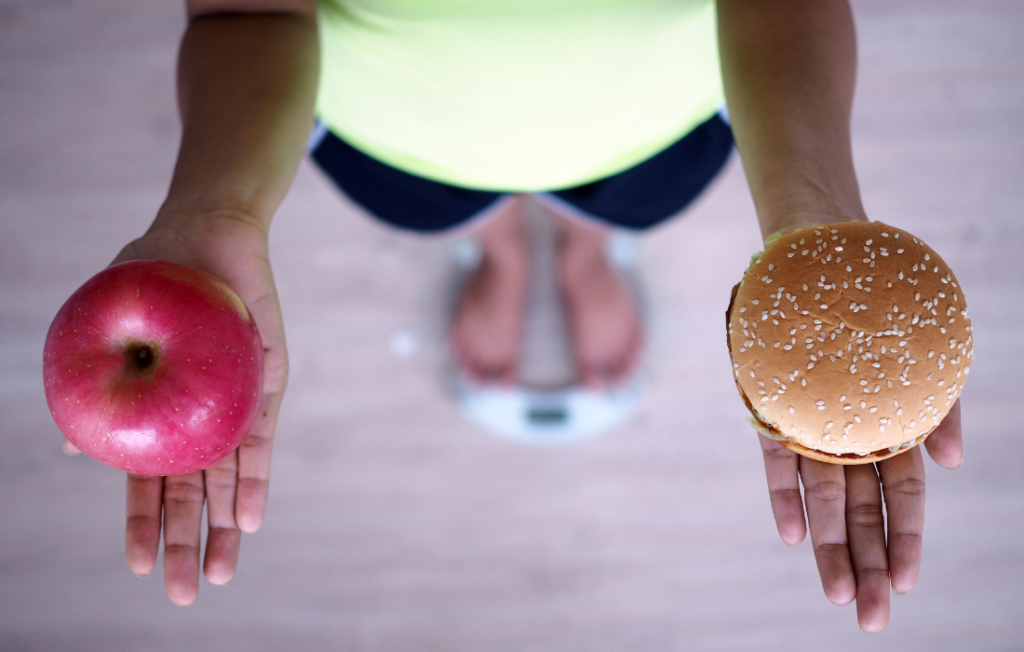
Myth #3: Restricting is the best way to lose weight
So many of us have experienced “success” with this formula:
Eat less + restrict sugar/carbs = weight loss.
When we’re working to find a more peaceful relationship around food, we cling to this old notion. We think we’ll NEVER find a comfortable weight if we eat normally. But sustainability is the name of the game.
Restriction, in any form, leads to frustration, crankiness, and inevitably going off whatever “plan” we were trying to follow.
(Followed by feelings of failures, guilt and blaming ourselves). The best way to restore our bodies weight equilibrium is NOT to restrict!
(**Thanks a lot, diet world, for messing with our heads on this one!)
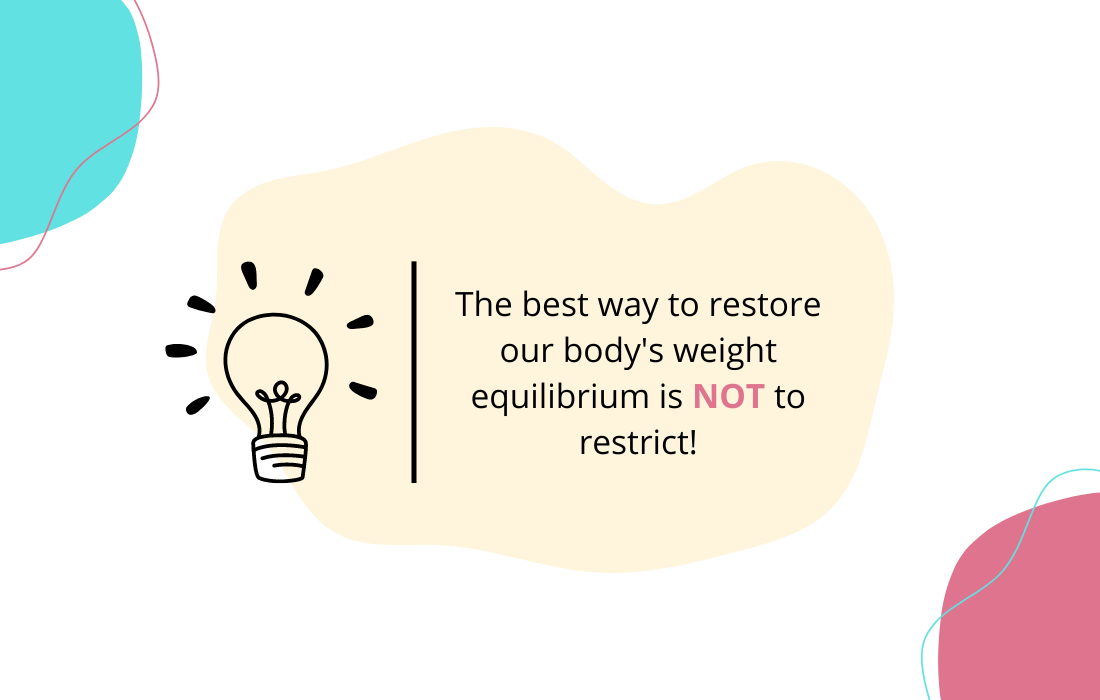
Myth #4: Food that tastes good is always bad for you
Have you ever bitten into a fresh garden grown tomato? Eaten watermelon on a hot summer day? Tasted simmering homemade spaghetti sauce hot off the stove?
There are incredible whole foods that taste delicious and satisfying.
In fact, I posted a poll in the Normal Eaters Club a few years ago and asked: If you could eat ANYTHING for your favorite meal, what would it be?
The answers were not donuts, cake, cookies, and brownies. They were “my mom’s homemade spaghetti”, “my grandma’s roast chicken with potatoes”, “a meal from a restaurant I went to in Italy”, and “a Greek dish with cheese and dairy (that I’ve always told myself I couldn’t have) that’s been in my family for years”, among others.
There are tons of foods out there that taste good AND are satisfying and nutritious. Sometimes it just takes a little bit of experimentation!

Myth #5: If you want to lose weight, go on a diet
The reality is that diets rarely result in long-term weight loss.
Have you ever wondered why we keep going back, again and again, to diets? Because if we go on something, we inevitably go off, and so we keep searching for the next “solution” that’ll be the one to last.
But none of them DO last. (*A UCLA study found that almost 2/3 of people who dieted gained MORE weight back than they initially lost.)
Diets are too hard to maintain.
They are usually restrictive, signal to our bodies that we need to “keep fuel” instead of “burn fuel” and miss out on giving us all of the nutrients we need to thrive. Plus, diets make us feel like a failure and we usually get even more frustrated and disillusioned than before! A more balanced, sustainable approach truly is what works for the long haul.
Weight loss is possible, but if you’re done with traditional dieting, then holistic weight loss might be something for you to check out.
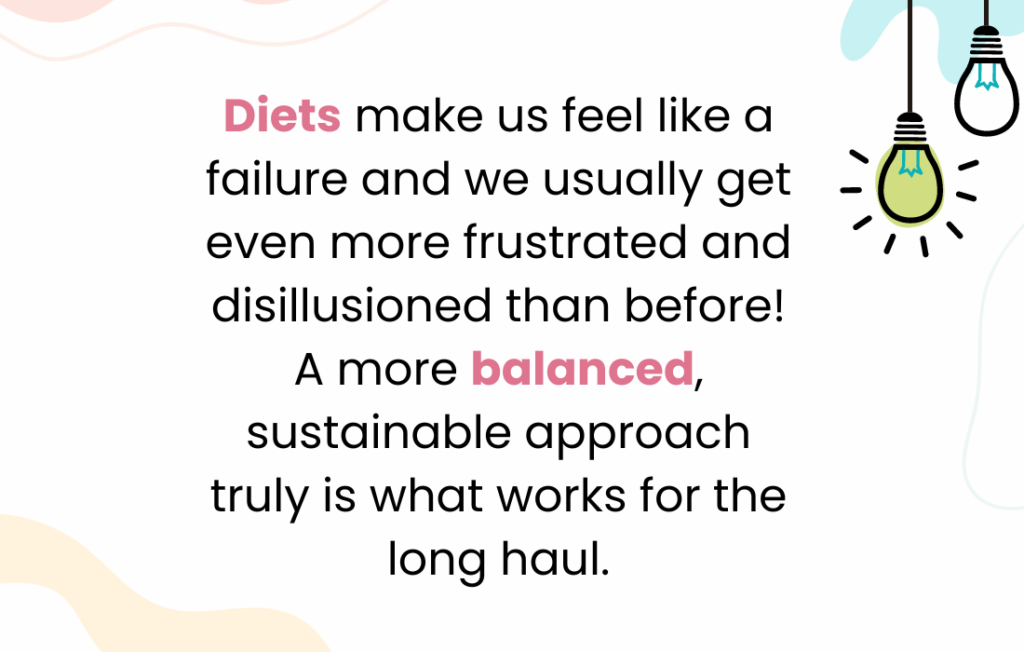
Myth #6: Eat less, move more
This one might be controversial, especially because most of our “success” around weight has been when we’ve eaten less and moved more. But hear me out…
When we eat less, we can move our bodies into “conservation mode”. This means that our bodies hold onto fuel instead of burning it, in fear it needs to conserve energy for the future. In addition to that, our relationship to food is complicated!
Imagine a doctor telling someone who is overweight battling diabetes to just “eat less, move more”.
If it were that simple, millions of people wouldn’t battle their weight. Food is emotional, mental and even spiritual. So much of our relationship to weight is healing the deeper beliefs, emotions, and habits that keep us stuck if we want the change to last.

Myth #7: All calories are equal
Counting calories might seem like a great strategy for weight loss.
But I could eat 1600 calories of Oreos, bread, steak and donuts or I could eat 1600 calories of vegetables, whole grains and lean proteins.
When we fixate just on calories, it misses the bigger picture of nutrition and health.
Calorie counting gives us the illusion of control. It gives us a security that we can control what we eat.
The reality is, like another other form of trying to control our food, it usually backfires. We go on and off the counting. We rebel at the end of the week and binge on the weekends. Instead of focusing on calories, it can be helpful to focus on balance (see below for more tips on where to focus!)
Here Is the True Key To Weight Loss
So what is the biggest factor in weight loss? The most mind numbingly annoying secret to weight loss…
… is that it’s actually NOT as simple as the diet world makes it out to be.
Here is the short list of things that impact weight loss:
- Genetics
- Metabolism
- Hormonal imbalances
- Stress
- Seasons
- Thyroid/Adrenal Glands
- Gut health
- Sleep
- Food sensitivities/allergies
And that’s just the start!
When we’re sold this idea that it’s OUR fault if we can’t lose weight, it only perpetuates the feeling of blame and shame if we struggle. One of my favorite blog posts I’ve ever written is “The Secret to Lasting Weight Loss” (read it here).
There is this deeper component to weight that’s missing in the diet world. The real key to weight loss is that depth. Exploring emotions and mindset. Redefining food rules that don’t serve us. Discovering what nourishes and satisfies us. Understanding our innate sense of worth (which can reflect out in how we eat). Learning the art of feeling emotions without turning to food.
None of this is addressed in the diet world (which is why our “results” don’t last!) So where do you start to begin to shift out of the “old” way of viewing weight?
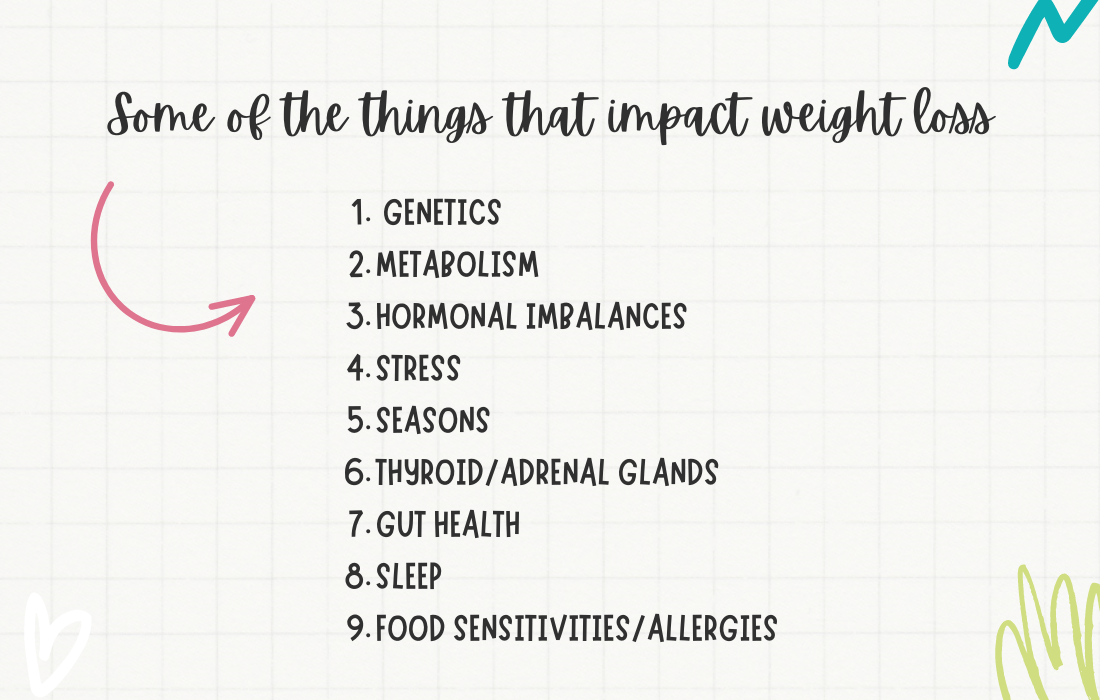
Bonus Tips: 3 Areas to Focus on Instead of Weight
If many of our weight beliefs and myths of weight loss aren’t true, where should we focus instead?
Here are three areas to explore:
Aim for health over weight
When we fixate on weight, we often miss the big picture of overall health.
We want to spot reduce, get rid of our flabby bellies or thighs, and get down to a smaller size. What would it look like to focus on health instead?
Explore what types of foods would feel nourishing and nutritious. Play around with different ways that you can move your body. Find new recipes to try.
Restoring our bodies to their comfortable weight doesn’t involve hating ourselves into change. Lasting shifts come from kindness, curiosity, and compassion in learning to let go of habits that don’t serve us and replace them with ones that do.
Here are some reflections to get you started:
- What would feel like a nutritious meal?
- What does it mean to be healthy?
- How does my body want to move?
- Where can I bring in more balance around food?
- How does it feel to explore health over weight?
- What is one healthy habit you want to play with?
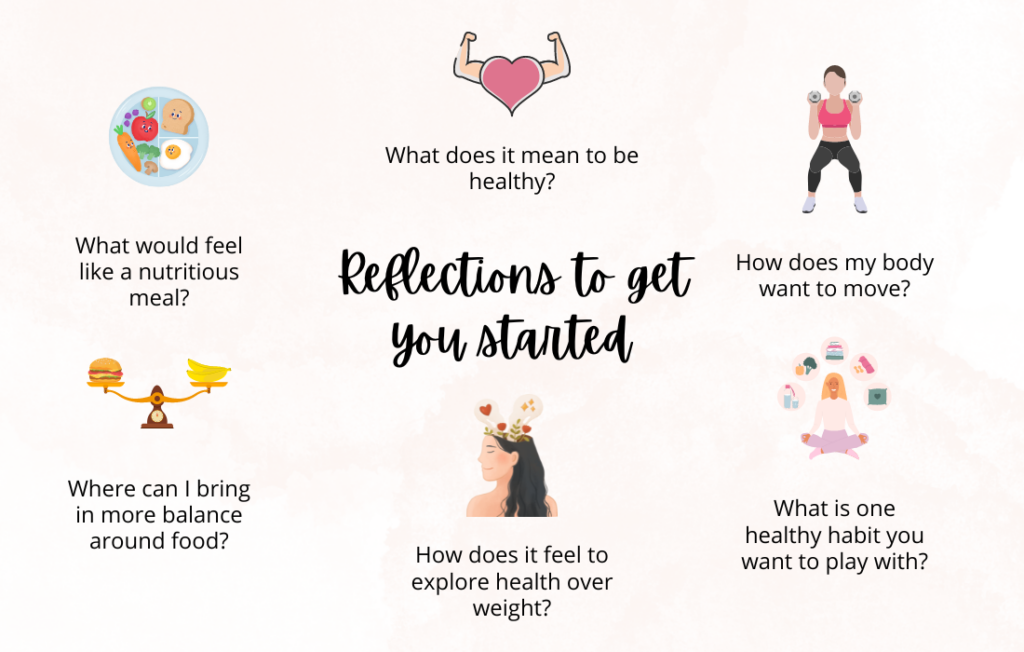
Look at the emotional & mental side of food
When I used to desperately try to “stop” the diet/binge cycle, I neglected a huge piece of the puzzle: my emotions and mindset.
I ate when I was stressed, bored, had anxiety or felt angst. But I also ate because emotionally, I didn’t know how to deal with life. Mentally, I was insanely critical of myself and hated my body (which would always cause me to overeat).
Our thoughts and emotions play a critical role in how we eat.
This is a big missing piece of any diet; it doesn’t look more deeply into WHY we do what we do around food.
Explore where your emotions and mindset play into how you’re eating. This can be very eye-opening and insightful! Because when we get to the root of why we do something, we can address the real cause of the problem.

Work on one habit a day
Often when we have a lot of things we want to change, it becomes overwhelming, and we shut down (and then don’t change anything)!
What can you focus on today or this week?
Bring yourself back to just ONE thing you can change. It could be physical, mental, or emotional. This process is small daily habits that build up to big changes over time.
(The opposite of what we learn in the diet world…we do XYZ to “get” a result. This path is learning how to create small shifts over time vs getting to the “end” for a result).
Here are a few ideas to experiment with:
- Meal plan dinners for this week
- Moving your body for 10-15 minutes a day
- Eating a vegetable with dinner
- Trying one new fruit or vegetable 3x this week
- Packing your lunch for work Monday-Friday
- Say one nice thing to yourself in the mirror every morning
The path to weight loss is all about letting go of the myths we believed, exploring more deeply our emotions and mental tapes and redefining our areas of focus!
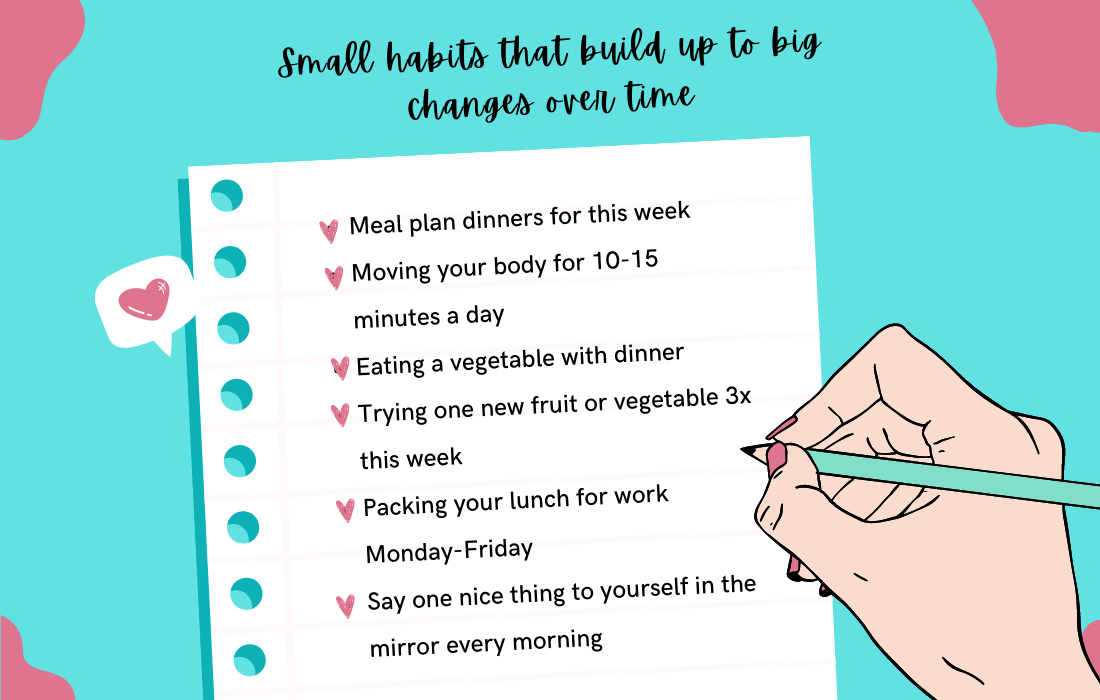
How I Found My Own Happy Weight
I always hesitate to share my own “weight” story, as I think for some people, it can detract from the overarching goal: finding food freedom and being “normal”. But I’ve had many women ask about my own weight journey and here are some of the things that helped me arrive at my body’s comfortable weight:
- Putting Weight Second
I always had this desperate battle between wanting to lose weight but also wanting to stop dieting/bingeing. When the desire to stop bingeing/dieting moved into the “top priority”, it helped me heal what needed to heal.
That doesn’t mean I didn’t want to lose weight. It just meant that I was determined to learn how to stop bingeing, trust my body, figure out how to eat “normally”, look at my emotions, explore body image, and do the hard inner work it takes to shift habits at a deeper level.
- Learning What My Body Needed
I’ve gone through a thousand different phases of how I eat over the years to learn more and more what works for my own body. This is important because we are not designed to just “follow” a plan. We need to learn what works for OUR OWN bodies! Each of us is different.
Some people do better with more or less animal protein. Others can handle higher carbs (others lower). Some people need to eat more often than others.
I’ve gone vegetarian, explored more vs less animal protein consumption, experimented with higher and lower amounts of carbs, eaten less dairy to see how it would impact my skin, played with amount of fat and fiber for satiation, and have learned to keep tuning in to see what my body is needing and wanting. This has helped settle my weight over the long haul.
- Hormonal Balancing
I’ve seen natural health practitioners and used many holistic health remedies over the years. My belief is that often times our out of balance weight may be a reflection of an internal imbalance. So when I’ve had weight stuckpoints, I’ve turned to the natural health world to calm my adrenals (hormonal balancing) and to help my body come back into balance.
(*This is my belief, so may not resonate with everyone!)
What’s Next? More Resources For You
There are a bunch of different resources for you to explore different aspects of weight in more depth:
- How to Get Off the Diet Roller Coaster
- Can You Lose Weight without Dieting?
- Food Freedom Bundle
- How to Be a Normal Eater Book
- 3 Best Tools to End Emotional Eating (And the Quiz)
- “I Gained Weight and Feel Like a Failure”
Get the Normal Eater’s Newsletter
Join 8000+ women who are overcoming overeating, binge eating, and breaking up with dieting forever. Get Jenn’s inspiring and actionable weekly newsletter with the latest posts, podcasts, and tips on how to love your body, find food freedom, and lose weight holistically.
Get the Normal Eater’s NewsletterWork with an Emotional Eating & Holistic Nutrition Coach
Overcome Bingeing and Emotional Eating, and Break Up with Yo-yo Dieting
Working with an emotional eating coach and holistic nutritionist can help you get free from the frustrating binge and restrict cycle and stop yo-yo dieting.
You don’t have to be obsessed with food or have a million rules around eating to find your natural weight and learn to love your body. Ready to actually see a lasting change and experience true freedom?
Schedule a 20-min CallAbout the Author:
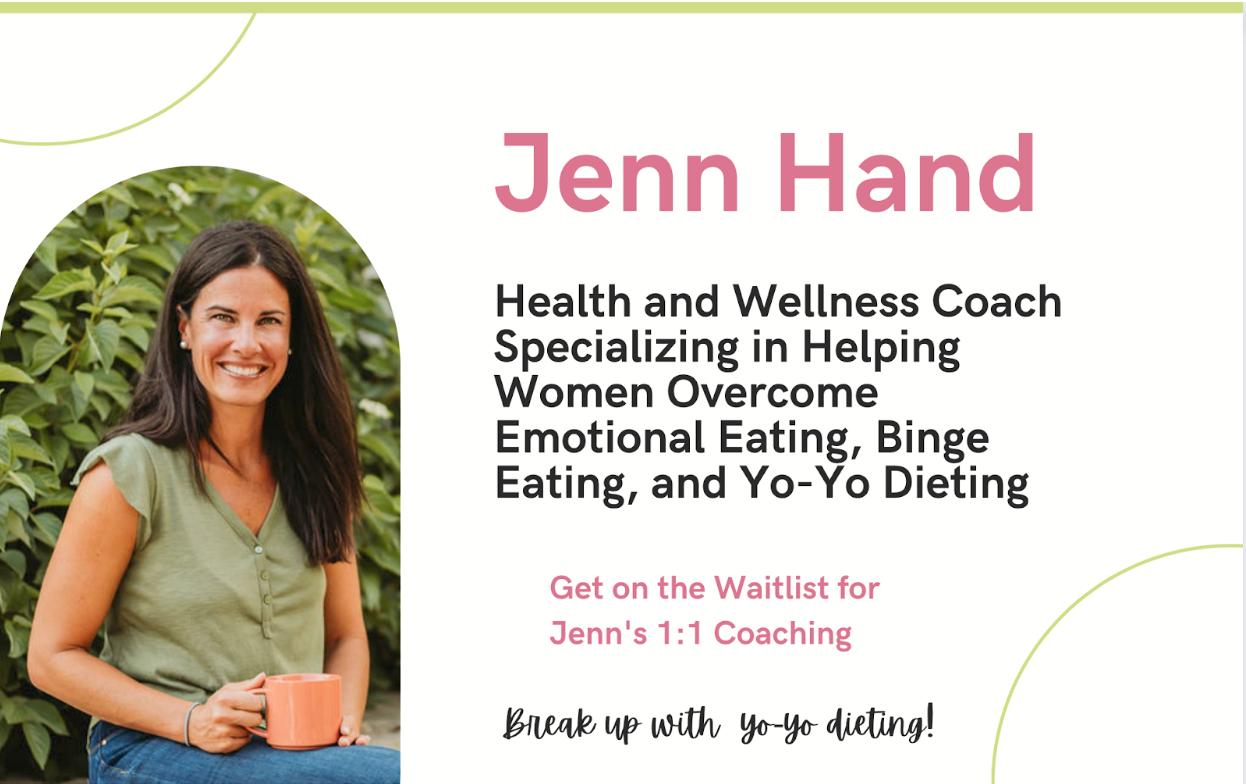
Jenn Hand has been helping women like you become normal eaters since 2015.
She’s worked with thousands of women, helping them to balance their bodies, end bingeing, stop obsessing over food, and start feeling amazing again. As a board-certified health coach and holistic nutritionist, Jenn knows how to support you in making real positive changes that last.
Her articles have been published on Mind Body Green, Tiny Buddha, Thrive Global and other local and global media platforms. She’s the author of How to Be a Normal Eater and the creator of The Normal Eater’s Club program. Listen to Jenn’s advice and tips on the Cake Doesn’t Count Podcast, or read more of her articles for free on the Food Freedom Blog.
Learn About Coaching!
